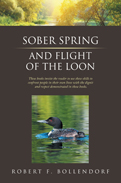
 |
The two heartfelt stories referred to in the title are about a family struggling with alcoholism and their measured engagement with recovery. “Sober Spring” is narrated in the viewpoint of Holly Brandt, wife of Hank Brandt, a construction worker. Holly, a church organist and homemaker, confides in her long-time family doctor, also a member of her church. Originally, Dr. Krueger brushes off Holly’s worries about Hank’s drinking and furtive behavior with the old saw that Hank is a good provider and has the right to quaff a few beers after work. After more conversation and reflection, Dr. Krueger refers Holly to a therapist who guides Holly and her five children to an intervention with Hank and the path to family recovery.
“The Flight of the Loon” continues shortly after the first story leaves off, this time featuring the viewpoint of Paul Brandt, a middle school child. After hearing the lonely cry of a loon from his northern Wisconsin home, he bonds with his science teacher, and they work to create a loon sanctuary on a local lake. There are worrying conflicts aplenty with local kids and Paul’s siblings while his parents are still hashing out their day-to-day ups and downs with recovery. The Brandt kids also navigate personal speed bumps, including an eating disorder, drug use, withholding information, and other situations that hinder participation in a 12-step program.
There’s a brief segue in the second story back into Holly’s viewpoint that feels intrusive, a narrative that might have been better seen through Paul’s eyes. Overall, though, the stories are empathetic and inspirational. As the author is a licensed clinical psychologist, professor emeritus, and former director of a drug education center, this lends a voice of authenticity to the narratives. Also included in the book are useful articles and guidelines for family recovery and relapse prevention.